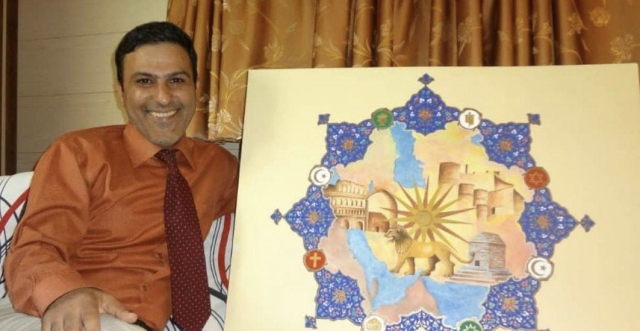The Islamic Revolutionary Court of Iran imposed the death sentence on the Iranian writer and illustrator, Mehdi Bahman over his alleged connections to Israel. This is according to reports by the Persian-language British Broadcasting Company (BBC) and the British-based "Iran International" channel, which is affiliated with the Iranian opposition and funded by Saudi Arabia. The date that the Iranian officials set for his execution was not revealed in the reports.
According to the reports, Bahman was arrested in October during the riots in the streets of Tehran, in which he took part. "Radio Parda", a Persian-language radio station broadcasting from the Czech Republic, reported that Bahman was arrested due to an interview he gave to an Israeli media outlet, but the charges against him are unknown. According to the exiled Iranian journalist and opponent of the regime, Golnaz Esfandiari, Bahman was accused of espionage following that interview with Israeli media.
A Revolutionary Court in Iran has sentenced dissident illustrator and author Mehdi Bahman to death, reportedly on charge of "espionage". Known for his efforts to promote religious coexistence, Bahman was arrested on October 12 after giving an interview to an Israeli TV channel. pic.twitter.com/hUk1Q4MHUl
— Iran International English (@IranIntl_En) December 29, 2022
About three months ago, Bahman was interviewed by Israeli Channel 12, following the riots that broke out in the country, in which he criticized the policies of the Ayatollah regime. Last year, he was also interviewed by Israel’s Channel 13 following his decision to translate his book into Hebrew. Bahman wrote the collection of stories "Bone-burning Cold", which was published in 2019 and was banned for distribution in Iran by the decision of the censorship committee of the country's Ministry of Culture. In addition, he had been working for the past 20 years to promote religious coexistence and dialogue in Iran with the religious leader, Massomi Tehrani.
I have been in shock ever since I heard the news of Mehdi's death sentence.
— nili (@smyranili) December 30, 2022
Mehdi is one of the most peaceful and non-violent people I have ever met.
He has spent many years of his life in coexistence between religions.
#Mehdi_Bahman
#Mahsa_Amini
#No_to_execution pic.twitter.com/WLNttAn7Dv
About three weeks ago, the first demonstrator in the Iranian protests, 23-year-old Mohsen Shekari, was executed. He was convicted of stabbing and injuring one of the security forces, as well as blocking a street in Tehran. He was executed in prison. Human rights organizations reported that Shekari was tortured in detention and was forced to confess what was attributed to him. A few days later, Iran executed 23-year-old Majidreza Rahnavard, who became the first person linked to the protest to be publicly hanged.
Iran carries out the death penalty almost more than any other country in the world, and it usually does so by hanging. At the beginning of December, it reported that it had executed four prisoners who it said had cooperated with the Israeli Mossad. Last month, "Amnesty International" reported that it received an official document in which a senior police chief in Iran demanded that the execution of prisoners be completed "as quickly as possible" and carried out in public, in a way that he said would be "a heartwarming gesture to the security forces."


